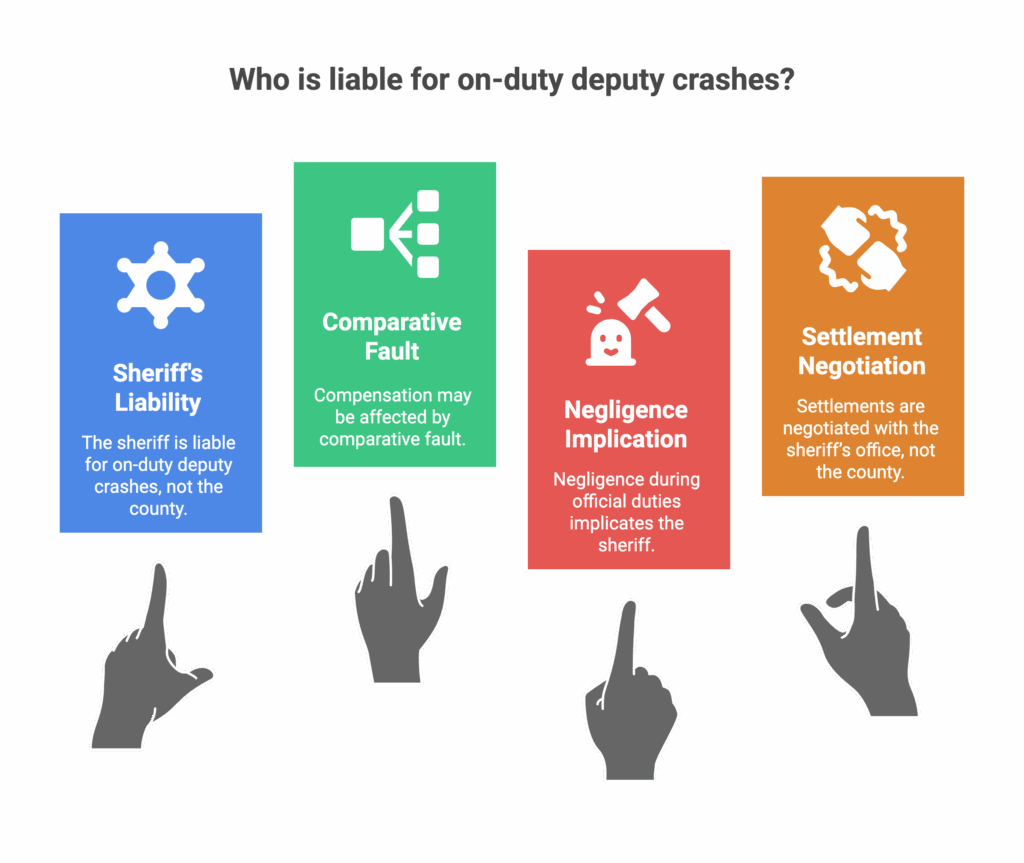If a Maricopa sheriff’s deputy causes a crash while on duty, the Maricopa County Sheriff’s Office—not the county government—is typically held responsible for any negligence, as Arizona law places vicarious liability on the sheriff’s office for deputies acting within their official capacity. Navigating these cases requires strict adherence to notice and claim procedures, and gathering strong evidence of negligence is essential. If you have questions about claim deadlines, comparative fault, or the steps to pursue compensation, Suzuki Law Offices can provide guidance and effective strategies. For more information, visit their Phoenix Personal Injury Lawyer page.
Overview of Deputy‐Caused Crashes in Maricopa County
When a Maricopa County sheriff’s deputy causes a crash, it’s not just an isolated incident—it highlights broader questions about responsibility and accountability within local law enforcement. If you’re involved in a collision with a deputy, you might immediately wonder about Maricopa County Sheriff deputy crash liability and who’s liable for a deputy collision in Maricopa County.
In these situations, determining Maricopa County deputy car accident responsibility depends heavily on whether the deputy was acting within the scope of official duties at the time of the crash. Negligence by a Maricopa County sheriff’s deputy—such as rear-ending another vehicle or failing to follow traffic laws—can lead to serious consequences for both the victims and the agency.
The recent Supreme Court ruling has brought increased attention to how these crashes are handled, making it crucial for you to understand how liability is assigned and what legal standards apply in these cases.
Committed to providing exceptional legal service to each and every client through integrity, compassion and experience.
Get StartedVicarious Liability for Sheriff’s Deputies in Maricopa County
Understanding who bears legal responsibility after a Maricopa County sheriff’s deputy causes a crash means looking at the doctrine of vicarious liability. In Arizona, if you’re involved in a Maricopa County deputy accident—or if a loved one suffers harm in a Maricopa County wrongful death deputy collision—the law doesn’t automatically hold the county itself responsible.
Instead, the Arizona Supreme Court clarified that the sheriff, not the county, is vicariously liable for deputies’ actions while they’re performing official law enforcement duties. This means the sheriff’s office bears responsibility for negligent acts that happen in the course of those duties.
If you’re considering filing a claim against the Maricopa County Sheriff’s Office, you’ll need to understand that the sheriff is the legally accountable party, not the county government. This distinction matters when pursuing compensation, as it directly affects who you can hold liable after a deputy-involved crash.
Filing a Notice of Claim in Maricopa County for Deputy Collisions
Before you can sue for damages after a crash caused by a Maricopa County sheriff’s deputy, Arizona law requires you to file a formal notice of claim. This notice of claim for a Maricopa County deputy accident must be submitted within 180 days of the incident. The process is crucial because the Maricopa County government may claim immunity in a deputy crash unless you strictly follow the statutory requirements. When filing a claim for a deputy-caused crash, you’ll need to detail the facts, damages, and a specific dollar amount you’re seeking.
Here’s a quick overview:
| Step | Deadline | Key Requirement |
|---|---|---|
| File notice of claim | 180 days | Written, detail all facts |
| Serve the correct parties | 180 days | Sheriff and County Clerk |
| State-specific damages | In notice | Include dollar amount sought |
Click to contact our personal injury lawyers today
Complete a Free Case Evaluation form now
Responsibilities of the Maricopa County Sheriff’s Office in Crashes
When a Maricopa sheriff’s deputy causes a crash, you’ll find that the Sheriff’s Office must oversee how deputies act and handle any internal investigations that follow.
They’re also directly responsible for what happens when deputies are on duty. This means you need to look to the Sheriff’s Office for answers and accountability after a collision involving one of their own.
Oversight of Deputy Conduct
While deputies carry out their law enforcement duties on Maricopa County roads, the Sheriff’s Office holds direct responsibility for overseeing their conduct—especially in incidents like vehicle crashes. You should know that the office’s supervisory responsibility means it must actively monitor and address deputy misconduct.
This isn’t just about prevention; it’s about law enforcement accountability when things go wrong. Sheriff liability comes into play when deputies act negligently while on duty, making the Sheriff’s Office answerable for their actions.
Here’s how the oversight works:
- Supervisors monitor deputies’ performance and adherence to protocols.
- The office investigates any signs of deputy misconduct.
- Policies are enforced to ensure safe driving and proper behavior.
- The Sheriff is held liable for deputies’ negligence during official duties.
Internal Investigation Procedures
Once a crash involving a Maricopa County sheriff’s deputy occurs, the Sheriff’s Office initiates an internal investigation to determine precisely what happened and who’s responsible. You’ll see a specific set of internal investigation procedures designed to assess whether law enforcement negligence played a role. Investigators collect evidence, interview witnesses, and review the deputy’s actions to establish the facts of the Maricopa County deputy crash. Their findings help clarify liability for sheriff’s deputy conduct. Here’s a quick look at the process:
| Step | Purpose |
|---|---|
| Scene assessment | Secure evidence and document the crash |
| Witness interviews | Collect unbiased statements |
| Deputy statement | Hear the deputy’s account of the incident |
| Policy review | Ensure actions align with procedures |
| Final report | Summarize findings and assign responsibility |
These steps ensure accountability and transparency.
Liability for On-Duty Actions
Even if a Maricopa County sheriff’s deputy causes a crash while on duty, Arizona law holds the sheriff—not the county—responsible for the deputy’s actions. When you’re involved in such an incident, understanding liability for on-duty actions is crucial.
The Maricopa County Sheriff’s Office, after a crash, must address any negligence by a deputy, since courts have ruled the sheriff is answerable for official conduct. If you’re seeking a settlement for a Maricopa County deputy caused crash, you’ll deal with the sheriff directly.
Keep these key points in mind:
- The sheriff, not the county, holds liability for on-duty deputy crashes.
- Comparative fault may affect your compensation.
- Negligence during official duties implicates the sheriff.
- Settlements are negotiated with the sheriff’s office, not the county.
How Maricopa County’s Claims Act Applies to Deputy Accidents
Because Maricopa County’s Claims Act sets the rules for handling claims against county entities, it’s important to understand how it works when a sheriff’s deputy causes a crash. If you’re considering suing the Maricopa County Sheriff’s Office after a collision, you need to know that Arizona law treats these incidents differently from standard car accidents.
While the Claims Act outlines how to file a claim against county entities, the Arizona Supreme Court clarified that liability for a deputy’s negligence typically falls on the sheriff, not the county itself.
If you’re dealing with an underinsured coverage deputy accident in Maricopa County, your own insurance may play a role, since the county’s liability could be limited by law.
Arizona law for a deputy crash in Maricopa County requires you to follow specific procedures, including proper notice and documentation. Understanding the Claims Act’s requirements ensures you protect your rights after a deputy-involved crash.
Statute of Limitations for Maricopa County Deputy Crash Claims
If you’re considering a claim after a Maricopa County sheriff’s deputy causes a crash, it’s crucial to know the statute of limitations that applies. In Arizona, strict deadlines govern how long you have to act. Missing these deadlines can bar you from recovering any damages, no matter how strong your case is.
Strict Arizona deadlines mean missing the window to file a claim after a sheriff’s deputy crash could cost you any chance at compensation.
When a sheriff’s deputy is involved, you must follow special rules for claims against government entities.
Here’s what you need to keep in mind:
- Notice of Claim: You must file a notice of claim with the appropriate government entity (typically the sheriff’s office) within 180 days of the incident.
- Civil Lawsuit Deadline: After filing your notice, you have one year from the crash date to file a lawsuit.
- Detailed Information Required: Your notice must include facts, a specific dollar amount, and supporting evidence.
- No Extensions: Courts rarely grant extensions for late claims, so act promptly.
Insurance & Risk Management in Maricopa County Deputy Incidents
When a Maricopa County sheriff’s deputy is involved in a crash, insurance and risk management play a critical role in how claims are handled and paid. You’ll find that the sheriff’s office carries its liability insurance, separate from county coverage, because the Arizona Supreme Court holds the sheriff—not the county—responsible for deputies’ actions during official duties.
If you’re injured or your property is damaged, your claim targets the sheriff’s insurance policy.
The county’s risk management team mainly oversees financial supervision, not operational decisions, so they won’t dictate how law enforcement handles claims. Instead, the sheriff’s office manages the process, working directly with its insurer to investigate the incident, assess damages, and negotiate settlements.
Understanding this structure helps you know where to direct your claim and what to expect during the process. The sheriff’s insurance is designed to address liability arising from deputies’ official conduct, streamlining your path to compensation.
Comparative Fault Rules in Maricopa County Deputy Collision Cases
When a crash involves a Maricopa County sheriff’s deputy, you’ll need to consider how comparative fault rules assign shared legal responsibility.
These rules directly affect the amount of damages you can recover based on each party’s degree of fault.
The evidence you present plays a key role in determining how much blame is assigned to each person involved.
Determining Shared Legal Responsibility
Although Arizona’s Supreme Court has clarified that sheriffs—not counties—bear legal responsibility for deputies’ actions during official duties, determining who pays for damages in a crash involves Arizona’s comparative fault rules. You’ll need to understand how these rules work if you’re involved in a collision with a Maricopa County sheriff’s deputy.
Arizona uses a pure comparative fault system, which means liability is split based on each party’s percentage of fault.
Here’s how shared legal responsibility is determined:
- Investigators assess the actions of all drivers involved in the crash.
- Each party is assigned a percentage of fault based on their conduct.
- The total amount of damages is divided according to these percentages.
- Even if you’re partially at fault, you can still recover damages reduced by your share of responsibility.
Impact on Damage Awards
Understanding how Arizona’s pure comparative fault rules affect damage awards is key if you’re involved in a crash with a Maricopa County sheriff’s deputy. In Arizona, even if you’re partly at fault, you can still recover compensation for your damages.
However, the amount you receive will be reduced by your percentage of fault. For example, if a court finds you 30% responsible for the accident and your total damages are $10,000, you’d recover $7,000. This rule applies even if a deputy’s negligence is apparent.
Since the Arizona Supreme Court’s ruling, the sheriff—not the county—is liable when deputies act within their official duties.
Ultimately, your share of fault directly impacts the compensation you can expect to receive after a deputy-involved crash.
Role of Evidence Presented
Because the outcome of a deputy-involved crash case hinges on comparative fault, the evidence you present plays a crucial role in determining liability and potential compensation. In Maricopa County, the court will carefully weigh each party’s actions before and during the collision.
Your ability to prove the deputy’s negligence—or your degree of fault—directly impacts the damages you might recover. To make your strongest case, focus on gathering and presenting clear, relevant evidence.
Here’s what you should prioritize:
- Police reports – Official accounts can clarify circumstances and assign initial responsibility.
- Eyewitness statements – Neutral perspectives can support or challenge fault claims.
- Dashcam or surveillance footage – Visual evidence often carries significant weight.
- Expert accident reconstruction – Objective analysis can pinpoint contributing factors.
Settlement vs. Litigation in Maricopa County Deputy Crash Claims
When a Maricopa County sheriff’s deputy causes a crash, you’ll likely face a choice between settling your claim or pursuing litigation. Settling often means a quicker resolution and less stress. However, litigation may be necessary if the sheriff or their insurer refuses to offer fair compensation. You’ll want to weigh the time, cost, and risk of trial against the certainty of an agreed settlement.
Here’s a quick comparison to guide your decision:
| Option | Pros | Cons |
|---|---|---|
| Settlement | Faster, less expensive | Possible lower payout |
| Litigation | Chance at higher compensation | Longer, more stressful |
| Mediation | Neutral third-party involved | Not always binding |
Each approach has trade-offs. Settlements typically keep matters private, while court cases become public record. Consider your priorities—whether it’s closure, compensation, or principle. Consulting with an experienced attorney can help you choose the best path for your situation.
Key Maricopa County Case Law on Deputy Liability
While you consider whether to settle or litigate after a sheriff’s deputy causes a crash, it’s essential to know how Arizona courts have shaped liability in these situations. Recent case law, notably a 2021 Arizona Supreme Court decision, clarified who’s responsible when a Maricopa County deputy is negligent on duty.
The court’s ruling set out clear parameters for when the sheriff, rather than the county, can be held liable.
Here’s what you need to know:
- Sheriff’s Responsibility: If a deputy commits negligence while performing official duties, the sheriff—not the county—is liable.
- County’s Role: The county only supervises the sheriff financially and isn’t liable for law enforcement decisions or actions.
- Legal Authority: Deputies operate under authority given by state law, not county directives.
- Future Lawsuits: This ruling shapes how future cases of deputy negligence are litigated, focusing liability on the sheriff’s office.
Frequently Asked Questions
Can a Sheriff Be Personally Sued for a Deputy’s Negligence?
If you’re wondering whether you can personally sue a sheriff for a deputy’s negligence, Arizona’s Supreme Court says yes.
When a deputy acts negligently while performing official duties, the sheriff—not the county—is held liable. You can take legal action against the sheriff because they’re responsible for their deputies’ conduct during law enforcement tasks.
This ruling clarifies accountability, so you know exactly who to pursue if you’re affected by a deputy’s actions.
Does This Ruling Affect City Police Officer Liability?
If you’re wondering whether this Arizona Supreme Court ruling changes liability for city police officers, it doesn’t.
The decision explicitly addresses sheriffs and their deputies, not city police departments.
City police officers still fall under the authority of their respective municipalities, so cities—not individual police chiefs—remain responsible for negligence claims.
You should know that the unique relationship between counties and sheriffs doesn’t apply to city law enforcement under this ruling.
Are Deputies Required to Carry Their Own Personal Liability Insurance?
You aren’t required to carry your personal liability insurance as a sheriff’s deputy in Arizona.
The law generally holds the sheriff, not individual deputies, liable for negligence while you’re performing your official duties.
Your actions, as long as they’re within your job scope, fall under the sheriff’s responsibility.
However, you might choose to get personal liability insurance for extra protection, but it’s not a legal requirement for deputies in Arizona.
Can Victims Seek Punitive Damages From the Sheriff?
If you’re a victim seeking punitive damages from the sheriff, you face significant challenges. Arizona law typically restricts punitive damages against government officials acting within their official duties, including sheriffs.
While you can pursue compensatory damages for negligence, courts rarely allow punitive damages unless you prove intentional misconduct or gross negligence.
You’ll need to consult an attorney to evaluate your case, but don’t expect punitive damages to be readily available in these situations.
Does the Ruling Apply Retroactively to Past Incidents?
You’re probably wondering if this ruling applies to incidents that happened before the decision. Typically, court rulings like this one do apply retroactively unless the court specifically says otherwise.
That means if you were involved in an incident with a deputy before the ruling, you could see the new standard applied to your case.
However, every situation is unique, so you should talk to a legal expert about how this affects your specific circumstances.
Call or text (602) 682-5270 or complete a Free Case Evaluation form





